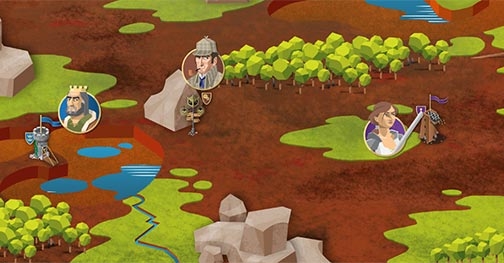The PLENTIS project is developing a set of online educational minigames on the topic of agricultural entrepreneurship, in order to develop the entrepreneurial skills and competences of vocational students.
According to the Lisbon Strategy, one of the 8 key competences is the ability for entrepreneurship. As entrepreneurship cannot be identified as one competence, but as a set of competences, the PLENTIS project aims to develop an online educational platform, which is basically a gamified competence development land (literally), with actual content (knowledge base) and individual games to help teachers and students develop those skills and competences essential for entrepreneurship.
The Plentis project is funded by the European Commission’s Erasmus + programme. The project started in September 2014 and lasts for 2 years. The main field of the project is to develop an online game based learning platform and a supporting teachers’ handbook in the topic of agricultural entrepreneurship development.
Learn to play – Play to learn | The method in the background
Learning by playing is actually a form of learning by doing. There are numerous studies (see links below) suggesting that indeed there are topics, subjects etc that can be better acquired by practicing, and not just reading over and over. This method is not a magic. We just have to remember when we were little children we barely sat down to learn but were playing all day long. Why not to continue learning by playing as an adult? Of course not the same way, but with the use of well structured educational games. With the use of such games (online or offline) participants can experience risk without real danger. These kind of games can make the player curious about a given topic, and as the learning process happens unconsciously, the player is not focusing or stressing on learning, but enjoying the game. Educational games are especially useful in the field of competence development.
Experts suggest that games based learning approaches can provide a number of benefits, such as:
- Motivating learners to succeed and to continually improve,
- fostering self-esteem, self-determination and enhancing self-image,
- facilitating collaborative learning,
- implicitly developing learners ability to observe, question, hypothesise and test,
- facilitating metacognitive reflection,
- developing complex problem-solving skills
(source: educationscotland)
Expected Project Outcomes
The main product of the Plentis project is the Agropoly online serious game platform. This is a virtual place which reunites the fun of playing with games and usefulness of learning entrepreneurial skills and competencies for students of agricultural sector. If these students are open or plan to start their own business in the future, they will already have an idea about real life situations as well as they get an idea about their competencies to be developed.
The game itself has a frame story serving as a starting point to give them motivation to perform well and achieve points. This framework is about building up their own enterprise depending on their collected points they earn based on their correct answers; this way it will presumably motivate them to solve as many tests as possible. Besides the tests – based on different types of game engines – real life simulations, decision trees can also be found (and played) on the platform. The platform contains 6 knowledge bases, covering the important topics of agricultural entrepreneurship and the essential competences belonging to it. 8-10 minigames belong to every knowledge center, with the aim of developing the competences.
The achievements of the players will be honoured by a pointing system. The points can be used to purchase different objects and placed individually on this forsaken land, making their gaming area more personalised. The players can compare their progress through these objects and the development of the piece of land each of them own.
Runtime: 9/2014-8/2016
Program Scheme: Erasmus+
Project reference: 2014-1-HU01-KA202-002365
Promoter: Trebag Ltd, Hungary
Website: Plentis
Further information:
Source: Plentis project website
